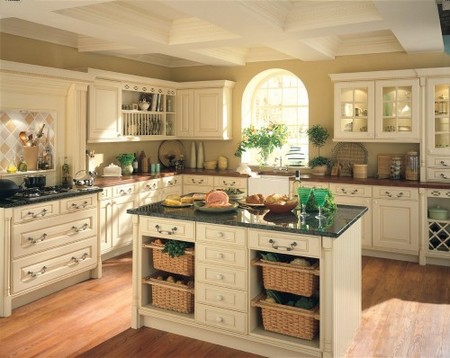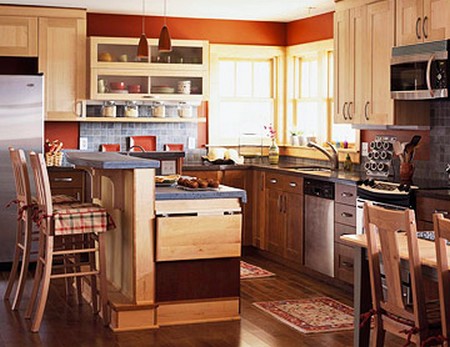Safety in the kitchen means more than simply taking the common-sense precautions. It also means recognizing the ecological and health hazards in the kitchen and being aware of how to safeguard against them or even avoid them.
Saving resources
In planning your kitchen it is now important to think not only about the most efficient use of space, but also how to save energy and avoid pollution. Many of the everyday appliances in our kitchens are heavy consumers of energy and some even pollute the atmosphere. Fridges and freezers, for example, give off CFCs which are known to damage the ozone layer. It may be some time before you will be able to buy a safe alternative, but at least you can make sure that you use a fridge or freezer efficiently. Never buy one which is too big for your needs, always keep it as full as possible and defrost it regularly.

Stoves and ovens – whether they are fuelled by gas, electricity or oil – are the biggest users of energy in the kitchen. Plan your cooking so as not to waste energy. Always cook more than one dish at a time in your oven, use stacked steamers to cook all the vegetables at the same time, but using only one saucepan, put lids on saucepans, use the right size pans for the source of heat and do not overcook food. Before using any electrical equipment, each time you reach for a switch ask yourself: do I really need to turn this on or could I just as easily do this by hand?
Water consumption
Saving water also takes a little forethought. Use a bowl in your sink rather than leaving the tap running and boil only as much water in your electric kettle as you think you will need. Do not set the dishwasher off until you have a full load; use economy settings where possible and get an expert to service the machine regularly.
Waste disposal
The kitchen generates more waste than any other room in the home. Take steps to cut down on waste and recycle or reuse whatever you can. Avoid buying overpackaged goods. Choose fresh food which is sold loose, returnable glass bottles rather than plastic ones and aluminium cans which can be recycled. If you have to buy packaged goods, choose those wrapped in cardboard, greaseproof paper or cellophane which is biodegradable. Keep any left-over food and organic matter for garden compost; sort other types of waste into separate bins (one for glass, another for paper etc) for various methods of disposal, depending on the local services available to you.
Toxic and non-biodegradable cleaning products which get washed down the sink pollute the water. Always read the labels to check the contents of any product you use and try to buy nontoxic alternatives where possible.
Preparing food
The day-to-day preparation of food in your kitchen calls for strict hygiene to safeguard you and your family against food poisoning. Bacteria, which cause most cases of food poisoning, will multiply on food given the right conditions. To prevent this it is essential to keep your hands and all equipment and surfaces spotlessly clean. Never use a knife or any blade with which you have cut raw meat or fish to cut anything else afterwards – wash it the moment you have used it. Scrub chopping boards and marble tops clean between uses. Always keep cooked and raw food separate. Food which is left out should be covered. Remember that bacteria breed in warm temperatures, so cool food down as quickly as possible after cooking (not in the fridge or freezer or it could warm up other foods).
Most bacteria are killed by very high temperatures, so always make sure that food is cooked right through. Take special care to thaw frozen fish and poultry thoroughly before cooking – the bacteria will have stopped multiplying in the freezer, but they may still be present and will die only if exposed to very great heat. Be careful when using a microwave oven, as microwaves do not always heat food to temperatures at which food poisoning bacteria are killed. Pressure cookers, on the other hand, are useful because they cook at very high temperatures.

Checking labels
If you or anyone in your family suffers from allergies you should be careful about the food you buy. Certain food additives can cause allergic reactions in some people. Always check the ingredients listed on labels of food and drink sold in supermarkets and try to choose ‘wholefoods’ or ‘organic’ foods rather than those produced with the help of artificial fertilizers, pesticides, preservatives or additives.
Safe materials
Some of the materials used in your kitchen may also be hazardous to your health. For example, aluminium pans and some non-stick coatings are now thought to contaminate food and increase the risk of certain diseases. Copper pans sometimes accumulate a poisonous deposit of verdigris if not cleaned properly. Certain plastics used in laminated surfaces, food containers and clingfilm give off harmful gas. Where possible, use stainless steel, cast-iron, toughened glass or enamel.